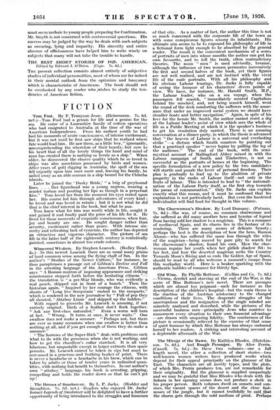The Heroes of Smokeover. By L. P. Jacks. (Hodder and
Stoughton. 7s. 6d. net.)—Readers who enjoyed Dr. Jacks' former Legends of Smokeover wilt be delighted to have a farther opportunity of being introduced to the struggles and humours of that city. As a matter of fact, the author this time is not so much concerned with the corporate life of the town as with some conspicuous figures among its inhabitants. His ultimate aim seems to be to expound his philosophy of life in a fictional form light enough to be absorbed by the general reader. The result is the convenient mechanism of a series of portraits of men into whose mouths the author can put his own favourite, and to tell the truth, often contradictory theories. The noun " men " is used advisedly, because, although the influence of two women permeates successively the first and second halves of the book, yet their figures are not well realized, and are not instinct with the vivid life of the male portraits. With all his philosophy and his obvious Labour leanings, Dr. Jacks is fully capable of seeing the humour of his characters' divers points of view. We have, for instance, Mr. Harold Smith, M.P., the Labour leader, who on a sea voyage, when the passengers fell seasick, " immediately scented Capitalism behind the mischief, and, not being seasick himself, went the round of the deck comforting the sufferers with the assur- ance that under an improved social system we should have steadier boats and better navigation." Again, in spite of his love for the heroic Mr. Smith, the author cannot resist a dig at the Labour leader's point of view which sees the whole of life as a Public Meeting at which it is the speaker's business to get his resolution duly carried. There is an amusing conversation at a dinner party, in which the thesis is advanced that " the heaven of Labour is a universal and everlasting strike "—a dictum which Smith counters by pointing out that a practised speaker " never begins by pulling the leg of the audience." The end of the - book, with its semi- mystical account of Mallingford Abbey mixed in with the Labour campaign of Smith and Timbertree, is not so successful as the portraits of heroes at the beginning. The specific formulation of a new policy by the two candidates will startle and puzzle the lover of personal freedom. Their plan is gradually to lead up to the abolition of private property in the ranks of Labour itself—not only in the fruits of labour. This is intended to lead to " the nationali- zation of the Labour Party itself, as the first step towards the paean of consummation." Only Dr. Jacks can explain exactly what this means, and it must be confessed that his explanation is not particularly lucid. But even the hardened individualist will find food for thought in this volume.










































 Previous page
Previous page